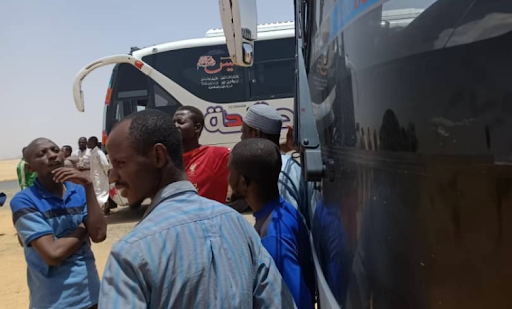Hundreds Of Nigerians Still Stuck At Sudanese Border As Airlift Begins In Egypt
Some Nigerian students who escaped Sudan are preparing to board aeroplanes home, but hundreds of others remain stranded at the border. Egyptian officials want them to wait on the Sudanese side, Nigerian officials say.

Despite social media video clips showing Nigerians preparing to board planes to come home, hundreds are still stuck at Sudan’s border with Egypt.
The Egyptian authorities are controlling the number of Nigerians entering the country, keeping evacuees waiting on the Sudanese side of the border until aeroplanes are ready, HumAngle understands.
For the students, it feels like they have been abandoned. “We are just helpless,” Khadija Hussain told HumAngle from the Sudanese border town of Halfa. “The embassy has left us on our own.”
Nigerians have been stranded for four days while diplomatic negotiations have been underway to secure permission for them to cross the border and travel the 374 km to Aswan.
The Nigerian Airforce and commercial airline Air Peace sent planes to Egypt. The first planes are due to take off in the next few hours.
A source with knowledge of the situation said the Egyptian government is restricting the number of people crossing the border to the number able to be airlifted from the airport at Aswan. The rest are being held at the border until the planes return.
Airlift
The Nigerians in Diaspora Commission tweeted a clip on Tuesday May 2, showing people lining up on the tarmac at Aswan airfield, But 12 hours later the planes had not left on the estimated 5 hour, 3,000 km flight back to Abuja.
There are as many as 700 students waiting in Halfa, Hussain said. There are more Nigerians at other border crossings between Sudan and Egypt.
Over 7,000 people of several nations, including Nigerians, were being held at the border with Egypt since their arrival on April 27, the Nigerians In Diaspora Commission, NIDCOM said.
It is not known how many Nigerians will be able to be airlifted at once.
Sudanese authorities said evacuees must secure a visa or a written statement before they are allowed to enter Egypt, the students said.
Another route
“It’s a more than 12 hours journey from Khartoum, where we came from to this place. It’s a long journey because we had to spend a night on the road,” Hussain said.
Word among the evacuees was that Jordan, Qatar, and Turkey evacuated their citizens through Port Sudan in the east of the country, student Jamil Sawwa-sawwa said. But the Nigerian Federal Government initially decided to take the Egyptian route.
The town of Halfa, also known as Wadi Halfa, is 932 kms from Khartoum, on the shores of Lake Nubia, close to Egypt’s border. Port Sudan on its eastern Red Sea coast, is just over 840 km from the capital.
Nigerian students on state government sponsored scholarships were aided by the government of their state of origin.
Jigawa, Borno, Katsina, and Kaduna organised their own evacuations and hired buses, taking evacuees to Port Sudan.
As many as 27 buses arrived in Port Sudan May 3, they will be taken out by plane from an airfield that is still operating. But there are no planes there yet.
If that option becomes impossible, the evacuation will be done by boat to Jeddah, it is understood.
“I was not lucky to be part of that [Port Sudan evacuation],” Sawwa-sawwa, who is in Halfa, told HumAngle on phone.
No food
Nigerians trapped in the border have been complaining about lack of food, water, and sanitary facilities.
“For the first time since we arrived at the Halfa border, we were given food by the Nigerian Embassy in Sudan. And, this morning they shared some biscuits and juice among us,” Khadija Hussain said.
Not everybody got some of the food that was shared, she added.
Keeping phones charged to communicate with the outside world is an effort, Hussain said. They walk long distances from the derelict market where they are being housed, to charge their phones.
“We go to some shops in the city to charge our phones. We don’t need power for anything other than charging our phones in the situation we are now,” she said.
The conflict between the Sudan Armed Forces and the paramilitary Rapid Support Forces, has entered its third week. A shaky ceasefire was eventually agreed to allow citizens of other countries to leave Sudan, but the situation remains chaotic and unstable.
Support Our Journalism
There are millions of ordinary people affected by conflict in Africa whose stories are missing in the mainstream media. HumAngle is determined to tell those challenging and under-reported stories, hoping that the people impacted by these conflicts will find the safety and security they deserve.
To ensure that we continue to provide public service coverage, we have a small favour to ask you. We want you to be part of our journalistic endeavour by contributing a token to us.
Your donation will further promote a robust, free, and independent media.
Donate HereStay Closer To The Stories That Matter




